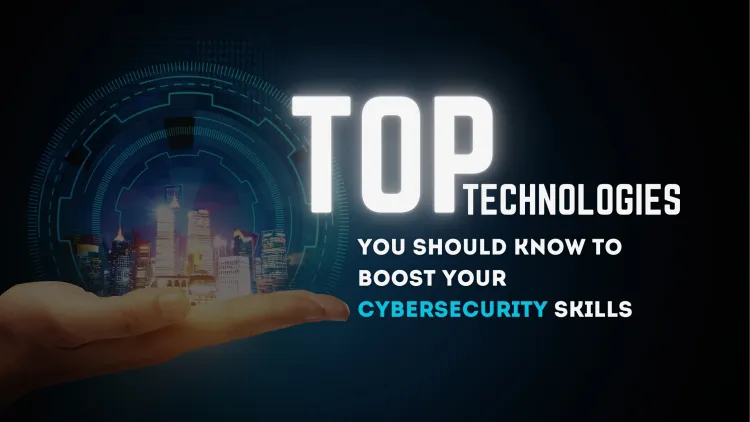Top Technologies you should know to Boost Your Cybersecurity Skills
In today’s digital world, mastering key technologies is crucial for a successful cybersecurity career. Technologies like firewalls and encryption provide foundational security by controlling network traffic and protecting sensitive data. Intrusion Detection and Prevention Systems (IDPS) help detect and block unauthorized access, while antivirus and anti-malware software safeguard systems from malicious attacks. Virtual Private Networks (VPNs) secure remote connections, and Security Information and Event Management (SIEM) tools analyze data to detect security incidents. As businesses increasingly move to the cloud, cloud security and Identity and Access Management (IAM) become essential for protecting data and controlling access. Penetration testing tools simulate attacks to identify vulnerabilities, and blockchain security addresses risks in decentralized systems. Additionally, the rise of Artificial Intelligence (AI) and Machine Learning (ML) enhances threat detection and response. Ma

In today’s increasingly digital world, cybersecurity has become a top priority for organizations of all sizes. With the rise of sophisticated cyberattacks, cybersecurity professionals are in high demand to protect sensitive information, secure networks, and maintain business continuity. If you're pursuing a career in cybersecurity, understanding the essential technologies is crucial for staying ahead in this ever-evolving field.
In this blog, we’ll explore the key technologies you need to master to develop a successful career in cybersecurity.
Why Technology is Crucial in Cybersecurity
Cybersecurity is about more than just protecting information. It's about safeguarding systems, networks, and users from a wide variety of threats. As these threats evolve, the tools and technologies used to defend against them must also advance. By gaining expertise in these technologies, cybersecurity professionals can better identify, prevent, and mitigate cyberattacks, ensuring the integrity, confidentiality, and availability of data.
Key Technologies Required for a Career in Cybersecurity
1. Firewalls
Firewalls are a cornerstone of any network security setup. They act as barriers between a trusted network (like your company’s internal network) and untrusted external networks (such as the internet). Firewalls monitor incoming and outgoing network traffic based on predefined security rules.
Why It's Important:
- Firewalls control and monitor traffic, blocking malicious activity.
- They act as the first line of defense against unauthorized access to your network.
- Cybersecurity professionals need to understand firewall configuration, management, and advanced features to ensure effective protection.
2. Encryption Technologies
Encryption is the process of converting information into a secure format to make it unreadable to unauthorized users. Common encryption techniques include AES, RSA, and SSL/TLS, which are used to protect sensitive data both during transit and when it is stored.
Why It's Important:
- Encryption ensures the privacy and integrity of data, especially for sensitive information like credit card numbers and passwords.
- Cybersecurity experts must know how to implement encryption methods to secure communications and prevent data breaches.
- It is essential for meeting regulatory standards like GDPR and HIPAA.
3. Intrusion Detection and Prevention Systems (IDPS)
Intrusion Detection Systems (IDS) and Intrusion Prevention Systems (IPS) are designed to detect and prevent unauthorized access to networks and systems. IDS monitors network traffic for suspicious activity, while IPS actively blocks threats once detected.
Why It's Important:
- IDPS technologies are vital for spotting potential cyberattacks early, helping to prevent data breaches and security incidents.
- Cybersecurity professionals should understand how to configure, monitor, and respond to alerts from IDS/IPS solutions to enhance threat detection and prevention.
4. Antivirus and Anti-malware Software
Malware, including viruses, worms, and ransomware, can infect your systems and steal sensitive data. Antivirus and anti-malware software help protect your devices by detecting, preventing, and removing malicious software.
Why It's Important:
- These tools provide a first line of defense against cyber threats, preventing malware from infecting systems.
- It is crucial for cybersecurity professionals to configure antivirus software correctly, manage updates, and respond to alerts to prevent malware attacks.
5. Virtual Private Networks (VPNs)
A VPN creates a secure, encrypted connection over a less secure network, such as the internet. It ensures that any data transmitted between the user and a destination network is encrypted and protected from eavesdropping.
Why It's Important:
- VPNs are essential for securing remote access, particularly in a work-from-home environment.
- They ensure the privacy and security of communications, protecting sensitive data from cybercriminals.
- Cybersecurity professionals need to understand how to implement VPN solutions and troubleshoot any issues.
6. Security Information and Event Management (SIEM)
SIEM systems collect and analyze log data from various sources (like firewalls, servers, and applications) to detect abnormal behavior and potential security incidents. These systems help cybersecurity teams to correlate events in real time, enabling faster response times.
Why It's Important:
- SIEM systems are critical for identifying attacks and monitoring network health.
- They enable cybersecurity professionals to gain insights into security incidents, ensuring timely detection and mitigation.
- Proficiency in SIEM tools is essential for security operations teams to stay ahead of emerging threats.
7. Cloud Security Technologies
As businesses continue migrating to the cloud, cloud security has become a vital aspect of modern cybersecurity. Cloud security tools are designed to protect data, applications, and systems hosted in cloud environments (e.g., AWS, Microsoft Azure, Google Cloud).
Why It's Important:
- Cloud platforms introduce unique security challenges, such as ensuring data privacy and controlling access to cloud-based resources.
- Cybersecurity professionals must understand how to secure cloud environments, implement Identity and Access Management (IAM), and monitor cloud activity.
8. Identity and Access Management (IAM)
IAM is a framework of policies and technologies that ensures only authorized users can access certain resources. It involves managing user identities, authentication methods, and access permissions.
Why It's Important:
- IAM tools are essential for preventing unauthorized access and ensuring that sensitive data is protected.
- Proficiency in IAM technologies like Single Sign-On (SSO), Multi-Factor Authentication (MFA), and role-based access control (RBAC) is a must for cybersecurity professionals.
9. Penetration Testing Tools
Penetration testing (or ethical hacking) is a proactive cybersecurity practice where professionals simulate real-world attacks to identify weaknesses in systems, networks, or applications. Tools like Metasploit, Nmap, and Wireshark are commonly used for penetration testing.
Why It's Important:
- Penetration testing is crucial for identifying vulnerabilities before malicious hackers can exploit them.
- Cybersecurity professionals need to master penetration testing tools to conduct thorough assessments and recommend fixes for discovered vulnerabilities.
10. Blockchain Security
With the rise of cryptocurrencies and decentralized applications, blockchain security is becoming increasingly important. Blockchain technology has its own set of security challenges, such as securing private keys and preventing attacks on the consensus mechanism.
Why It's Important:
- Blockchain applications are growing across industries like finance, healthcare, and supply chain, making it a valuable skill set in cybersecurity.
- Blockchain security professionals must understand how to mitigate risks such as 51% attacks and smart contract vulnerabilities.
11. Artificial Intelligence and Machine Learning
Artificial Intelligence (AI) and Machine Learning (ML) are rapidly gaining traction in the cybersecurity field. These technologies can automate threat detection, analyze patterns, and predict potential attacks, making them a powerful tool for cybersecurity professionals.
Why It's Important:
- AI and ML can significantly improve security by detecting threats that may go unnoticed by traditional methods.
- Cybersecurity professionals should understand how AI/ML algorithms work and how to implement them in threat detection systems.
Conclusion
A career in cybersecurity requires a diverse set of skills, and staying updated on the latest technologies is key to remaining competitive in the field. Mastering tools such as firewalls, encryption, IDS/IPS, SIEM, and cloud security will equip you to defend against the most sophisticated threats. Additionally, understanding emerging technologies like AI/ML and blockchain security will prepare you for the next generation of cyberattacks.
As the digital world grows more complex, cybersecurity professionals who are proficient in these technologies will continue to be in high demand. By building expertise in these areas, you can ensure a successful and rewarding career in cybersecurity.
Key Takeaways:
- Firewalls, encryption, VPNs, and IDS/IPS are fundamental cybersecurity technologies.
- Advanced tools like SIEM, IAM, and penetration testing are essential for modern security teams.
- Familiarity with cloud security, blockchain, and AI/ML will make you a valuable asset to any cybersecurity team.
- Certifications and hands-on experience are key to mastering these technologies.
By mastering these tools and staying updated with the latest trends, you will be well-equipped to protect against evolving cyber threats and build a successful career in the cybersecurity field.
FAQ:
-
What is cybersecurity technology?
- Cybersecurity technology refers to the tools, software, and processes used to protect computers, networks, and digital data from unauthorized access, attacks, and theft. This includes firewalls, encryption, antivirus software, intrusion detection systems, and more.
-
What is a firewall in cybersecurity?
- A firewall is a network security device that monitors and controls incoming and outgoing traffic based on predetermined security rules. It acts as a barrier between trusted and untrusted networks, helping to prevent unauthorized access to or from a private network.
-
Why is encryption important in cybersecurity?
- Encryption is crucial for protecting sensitive data by converting it into an unreadable format that can only be deciphered by authorized users. It ensures data privacy and integrity during transmission and storage, preventing unauthorized access to information such as passwords, credit card details, or personal data.
-
What is SIEM and why is it important?
- Security Information and Event Management (SIEM) refers to a set of technologies that provide real-time monitoring, event correlation, and incident response capabilities for detecting security breaches or abnormal activities. SIEM is important for identifying threats early and responding quickly to potential cyberattacks.
-
What is penetration testing in cybersecurity?
- Penetration testing, also known as ethical hacking, involves simulating real-world cyberattacks to identify vulnerabilities in systems, networks, and applications. It helps organizations find weaknesses before malicious hackers can exploit them.
-
What is the role of cloud security in cybersecurity?
- Cloud security focuses on protecting cloud-based systems, applications, and data. As more organizations migrate to cloud environments, securing cloud platforms against data breaches, unauthorized access, and cyberattacks becomes essential for protecting sensitive information.
-
What is multi-factor authentication (MFA)?
- Multi-factor authentication (MFA) is a security process that requires users to provide two or more forms of verification (something you know, something you have, or something you are) to access a system. MFA enhances security by adding an extra layer of protection against unauthorized access.
-
What is the difference between IDS and IPS?
- Intrusion Detection Systems (IDS) monitor network traffic for suspicious activities and alert security teams about potential threats. Intrusion Prevention Systems (IPS) go a step further by actively blocking malicious traffic or attacks once they are detected, preventing harm to the network or system.
-
How does machine learning help in cybersecurity?
- Machine learning (ML) is used in cybersecurity to analyze large amounts of data, identify patterns, and predict potential threats. ML models can detect anomalies, detect malware, and automatically respond to emerging cyber threats, improving the efficiency and effectiveness of security systems.
-
What certifications are needed to advance in a cybersecurity career?
- To advance in cybersecurity, certifications such as CompTIA Security+, Certified Information Systems Security Professional (CISSP), Certified Ethical Hacker (CEH), Certified Information Security Manager (CISM), and Certified Cloud Security Professional (CCSP) are highly recommended. These certifications validate your expertise and knowledge in cybersecurity and help you stand out in the field.











![Top 10 Ethical Hackers in the World [2025]](https://www.webasha.com/blog/uploads/images/202408/image_100x75_66c2f983c207b.webp)



![[2025] Top 100+ VAPT Interview Questions and Answers](https://www.webasha.com/blog/uploads/images/image_100x75_6512b1e4b64f7.jpg)







